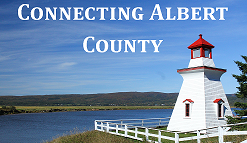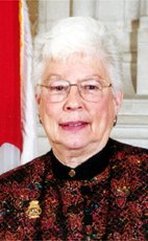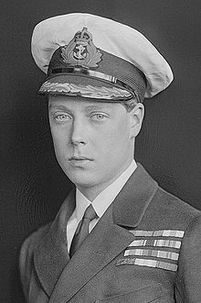 Edward in the 1920s
Edward in the 1920s who have courted more controversy
than King Edward VIII. Much of this
stems from changing social mores
and having had little time, nor desire,
to frame his own narrative.
Born in 1894 the new prince was
third in line to the throne after his
grandfather and father. His
upbringing was typical for a royal at
the time. However, one of his nannies
was found to have physically abused
him.
but the young prince did not excel to any particular degree.
He left Oxford after eight years without have gained any
academic qualifications.
In 1911 Edward was officially invested as the Prince of Wales.
Shortly before World War One Prince Edward had joined the
Grenadier Guards and he wanted to serve on the front lines.
However, Secretary of State for War Lord Kitchener nixed the
idea citing the harm that might come from his capture by the
enemy. Being prevented from fighting on the front lines did
not stop Prince Edward from visiting as often as he could. As
such he saw the horrors of trench warfare firsthand. This would have an impact on his later political beliefs. His role in
the war (despite being limited) made him popular with the
rank and file soldiers.
Throughout the late 1910s & 1920s Prince Edward often
represented the King at events throughout the British Empire.
During a tour of Canada in 1919 he acquired the Bedingfield
Ranch in Alberta. Many important Canadians would visit the
Prince's new ranch. Edward would stay at the ranch during
his years as prince and, after his abdication, his years as Duke
of Windsor. In 1927 as part of Canada's 60th birthday
celebrations him and his brother officially opened The
Prince's Gate.
While Prince Edward was at the height of his popularity
during these years two issues had arisen that would greatly
sour his legacy. The first issue was his views on his future
subjects that would charitably be called racist. The second
issue was his preference for women who were either married
or who the general public would not accept as queen. While
the first issue was largely ignored at the time (his views not
being too far from elite opinion at the time) it would come to
have the greatest effect on his legacy. The second issue was
the one that would most immediately bring him down (but
which the general public cares little about these days).
Simpson. Their relationship caused no small degree of
concern in the government. The police were ordered to follow
the two and establish the nature of their relationship.
In 1936 Edward ascended to the throne as Edward VIII.
Almost immediately he began to break royal protocol. On a
tour of Southern Wales he stated that "something must be
done" for the unemployed coal miners there. The government
interpreted this as improper interference.
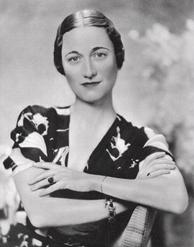 Wallis Simpson
Wallis Simpson Edward VIII called for his Prime
Minister. His Majesty informed Prime
Minister Stanley Baldwin of his
intention to marry Wallis Simpson.
Baldwin informed the King that the
public would not find this acceptable.
The King offered morganic marriage
as a suitable compromise. The British
Cabinet rejected this as well. And in
what was likely a first the dominion
governments of Australia, Canada &
South Africa expressed disapproval of the King marrying a
divorcee. King Edward was faced with three choices: 1. Give
up on marrying Wallis Simpson, 2. Marry against the wishes
of cabinet, or 3. abdicate. The King refused the first option
and knew the second would cause a constitutional crisis. Thus
the King made the decision to abdicate. The reaction to the
decision were manly negative and Canadian Prime Minister
Mackenzie King wrote in his diary that, "...if that is the kind of
man he is it is better he should not be longer on the Throne."
Wndsor) became a bit of a pariah. He married Wallis Simpson
on June 3rd, 1936. The ceremony was performed by Robert
Anderson Jardine (an act that cost him his position). The new
King George VI forbade the Royal Family from attending. This
act created a great deal of resentment over the following
years.
In 1937 the Duke and Duchess of Windsor, against the advice
of the British government, visited Nazi Germany. During the
visit the Duke gave full Nazi Salutes and met with Hitler.
There is some disagreement about whether the Duke favoured
fascism or not. His low opinion of other races has been used
as evidence Edward did favour it. However, in Edward's own
words "the unending scenes of horror" of World War One had
led him to support appeasement. Hitler's opinion of the Duke
is far less ambiguous believing that as king he would have
been an ally and that his abdication was a serious loss to
Germany. The couple's continuing association with known or
suspected Nazi sympathizers did not help quell the suspicions
about their political beliefs. This photo certainly didn't help:
British puppet state after he conquered the British Isles are
most likely mere fancy. The number of royals Hitler installed
in Europe is exactly zero. Even members of the former
German Imperial Family were only feted until Hitler realized
they wouldn't be of any further use to him.
However, it is likely the concerns that the Duke possibly had
Nazi sympathies that led him to be appointed governor of the
Bahamas (and far away from Europe) in 1940. He made the
final leg of his trip to the Bahamas on the Canadian
Steamship Lady Somers. He would remain governor of the
Bahamas throughout the war. Edward was praised for
combating poverty on the islands and defusing civil unrest
over low wages in Nassau. However, he considered the blacks
to be incapable of self-government and blamed the civil
unrest on communists and Jews.
After the war the Duke occasionally attended official
functions in Britain, spent time at his ranch in Alberta,
wrote the occasional book, and more or less lived in
retirement.
As time has gone on the role his marriage played in Edward's
abdication has been downplayed. Instead his politics have
been given greater weight. As Historian Philip Williamson
argues this is a mistake brought about by the increased social
acceptance of divorce. Edward's views were certainly racist
but there is little evidence he supported Nazism. He remains
the most controversial member of Canada's Royal Family.
Loyally Yours,
A Kisaragi Colour
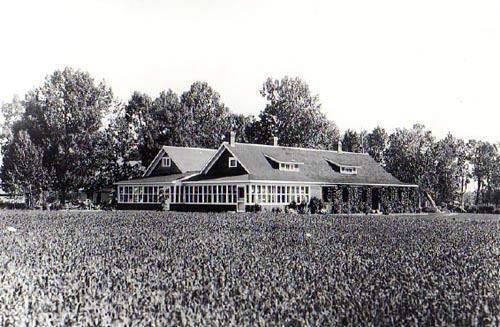
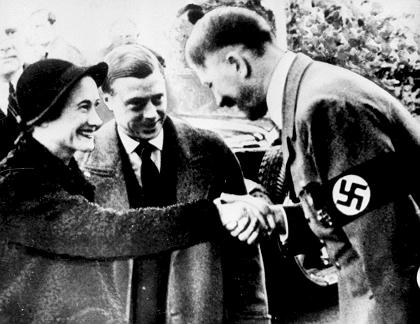
 RSS Feed
RSS Feed



